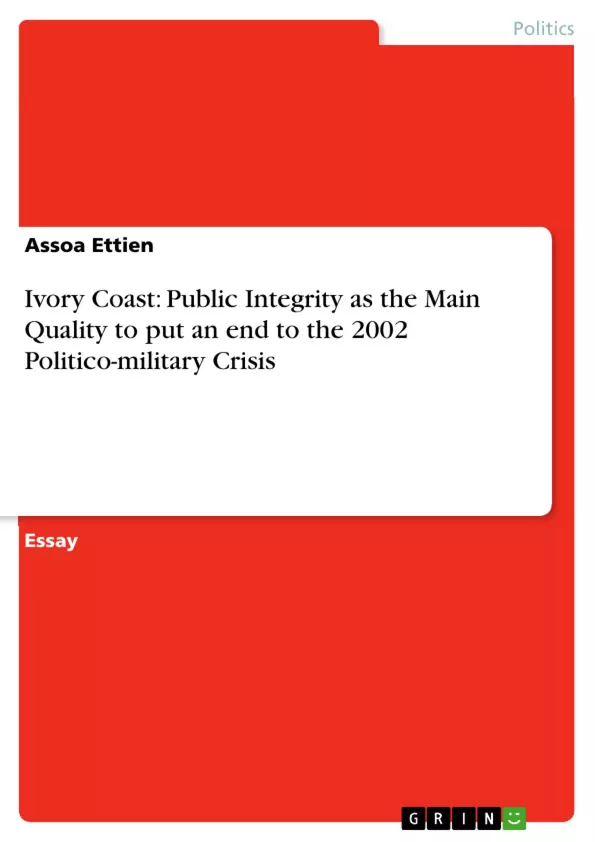Ivory Coast is in a severe politico-military crisis since 2002. The Country is almost under the administration of the international community. Presidential elections seem to be the only solution to stop this crisis. The national and the international communities put their trust on Robert Beugre Mambe for clean presidential elections. However, Beugre Mambe does not seem to deserve this trust. He decided to favor a candidate and was caught.
Inhaltsverzeichnis (Table of Contents)
- A.) Introduction:
- B.) Facts Description:
- 1.) Crisis Background:
- 2.) The Struggle of Houphouet's Heirs:
- 3.) Bedie's Power and the Political Coup:
- 4.) General Guei and the Military Transition:
- 5.) The Election of President Gbagbo and the Mass Grave Discovery:
- 6.) The 2002 Crisis:
- 7.) The Failed Peace Agreements:
- 8.) The Ouagadougou Peace Agreements:
- 9.) Partial Conclusion:
- c.) General Analysis:
- 1.) Brief Summary of the Facts:
- 2.) Partial Conclusion:
- D.) Actualization:
- 1.) Patrick Dobel's Contribution on Public Integrity:
- 2.) A brief Analysis of Beugre Mambe's Downfall:
- 3.) Partial Conclusion:
- E.) General Recommendations:
- F.) Conclusion:
Zielsetzung und Themenschwerpunkte (Objectives and Key Themes)
The primary objective of this text is to examine the role of public integrity in the resolution of the Ivorian crisis, specifically focusing on the events leading up to and following the 2002 political-military conflict. The text aims to provide a comprehensive analysis of the crisis, including the background, key figures, and failed peace agreements, to demonstrate the importance of public integrity in ensuring stability and preventing future crises.
- The Ivorian crisis and its historical roots.
- The role of key figures in the conflict, including Houphouet-Boigny, Bedie, Ouattara, and Gbagbo.
- The importance of public integrity in maintaining stability and resolving political disputes.
- The impact of corruption and lack of integrity on the political system.
- The challenges faced by national and international communities in mediating the crisis.
Zusammenfassung der Kapitel (Chapter Summaries)
- A.) Introduction: This chapter defines public integrity and its significance in the context of the Ivorian crisis. It sets the stage for the analysis by highlighting the role of the Independent Election Commission and the alleged involvement of Robert Beugre Mambe in electoral fraud.
- B.) Facts Description: This section provides a detailed overview of the Ivorian crisis, starting with the background, key figures, and events that led to the 2002 conflict. It explores the political struggles of Houphouet-Boigny's successors, the rise and fall of President Bedie, the military transition under General Guei, and the failed peace agreements that culminated in the Ouagadougou Peace Agreements.
- c.) General Analysis: This chapter offers a concise summary of the facts presented in the previous section, highlighting key themes and trends. It emphasizes the importance of public integrity as a crucial element in resolving the Ivorian crisis and preventing future conflicts.
- D.) Actualization: This section examines the concept of public integrity in greater detail, exploring the contributions of Patrick Dobel and analyzing the downfall of Robert Beugre Mambe in the context of electoral fraud and the crisis. It provides a deeper understanding of the practical implications of public integrity and its role in preventing corruption and ensuring fair elections.
Schlüsselwörter (Keywords)
The main keywords and focus topics of this text include: Ivorian crisis, public integrity, political corruption, electoral fraud, peace agreements, Ouagadougou Peace Agreements, Independent Election Commission, Robert Beugre Mambe, Patrick Dobel, Alassane Ouattara, Henry Konan Bedie, Felix Houphouet-Boigny, General Guei, Laurent Gbagbo.
Frequently Asked Questions
What caused the 2002 politico-military crisis in Ivory Coast?
The crisis was rooted in long-standing political struggles among Houphouet-Boigny's heirs, military coups, and disputed elections involving key figures like Bedie, Guei, and Gbagbo.
Who is Robert Beugre Mambe and what was his role?
He was the head of the Independent Election Commission, entrusted with organizing fair elections, but his downfall was triggered by allegations of electoral fraud.
What are the Ouagadougou Peace Agreements?
These were peace accords aimed at resolving the conflict between the government and rebels, paving the way for presidential elections as a solution to the crisis.
Why is public integrity crucial for Ivory Coast's stability?
Public integrity is essential to prevent corruption and fraud, which undermine trust in political institutions and often serve as catalysts for violent conflict.
What did Patrick Dobel contribute to the concept of public integrity?
Dobel's work emphasizes that public officials must balance personal ethics with institutional responsibilities to maintain the legitimacy of the state.
- Quote paper
- Assoa Ettien (Author), 2009, Ivory Coast: Public Integrity as the Main Quality to put an end to the 2002 Politico-military Crisis, Munich, GRIN Verlag, https://www.grin.com/document/156606



